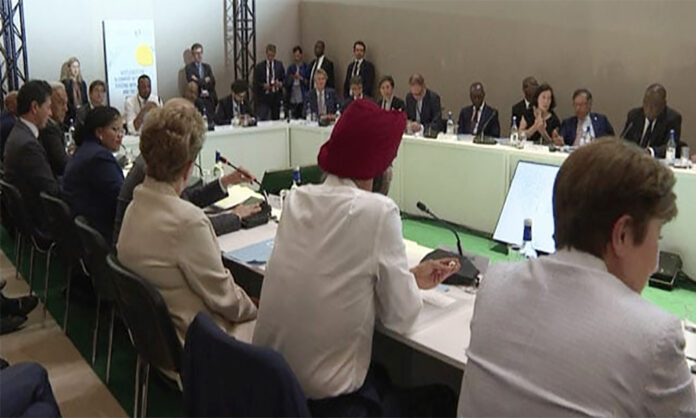
A global summit seeking to overhaul the international financial system wraps up Friday after taking small steps towards easing the debt burden of developing nations weighed down by climate and economic crises.
While host country France pitched the conference as a consensus-building exercise, leaders are under pressure to produce clear outcomes from the two- day meeting as economies stagger under growing debt after successive crises in recent years.
The summit comes amid growing recognition of the scale of the financial challenges ahead, with warnings that the world’s ability to curb global warming at tolerable levels is reliant on a massive increase in clean energy investment in developing countries.
With trust in short supply over broken climate financing promises from richer countries, developing nations are looking for tangible progress.
The V20 group of countries on the climate front lines — which now includes
58 member nations — has said restructuring the global financial system to
align with climate targets must be completed by 2030.
“We come to Paris to identify the common humanity that we share and the
absolute moral imperative to save our planet and to make it liveable,” said
Barbados Prime Minister Mia Mottley, whose Caribbean island nation is
threatened by rising sea levels and tropical storms.
She has become a powerful advocate for revamping the role of the World Bank
and International Monetary Fund in an era of climate crisis.
Barbados has put forward a detailed plan for how to fix the global financial
system to help developing countries invest in clean energy and boost
resilience to climate impacts.
One key announcement came from IMF director Kristalina Georgieva, who said a
pledge to shift $100 billion of liquidity-boosting “special drawing rights”
into a climate and poverty fund had been met.
World Bank president Ajay Banga said the lender would introduce a “pause”
mechanism on debt repayments for countries hit by a crisis so they could
“focus on what matters” and “stop worrying about the bill that is going to
come”.
Separately, Senegal was promised 2.5 billion euros ($2.7 billion) by a group
of wealthy nations and multilateral development banks to help the west
African country reduce its dependence on fossil fuels.
And Zambia, which defaulted on its debt after the Covid pandemic broke out,
secured some financial relief as its main lender China and other creditors
agreed to restructure $6.3 billion in loans.
On Twitter, Zambian President Hakainde Hichilema called it a “significant
milestone in our journey towards economic recovery & growth”.
– Turning ‘billions to trillions’ –
But much more is needed to help developing countries combat climate change.
Macron said he was hopeful that a pledge to deliver $100 billion a year in
climate finance to poorer nations by 2020 would finally be fulfilled this
year — although actual confirmation the money has been delivered will take
months if not years.
This week, the International Energy Agency said annual investment just for
clean energy in these countries will need to jump to nearly $2 trillion
within a decade.
This is crucial to keep alive the Paris Agreement goal of limiting global
warming to “well below” two degrees Celsius since pre-industrial times, and
below 1.5C if possible.
Ideas for how to turn “billions to trillions” for these climate and
development goals include using multilateral development banks to help unlock
climate investments, as well as taxation on fossil fuel profits and financial
transactions to raise climate funds.
France backs the idea of an international tax on carbon emissions from
shipping, with hopes for a breakthrough at a meeting of the International
Maritime Organization in July.
Countries also want disaster clauses added to new debt arrangements to allow
a country to pause repayments for two years after an extreme weather event.







